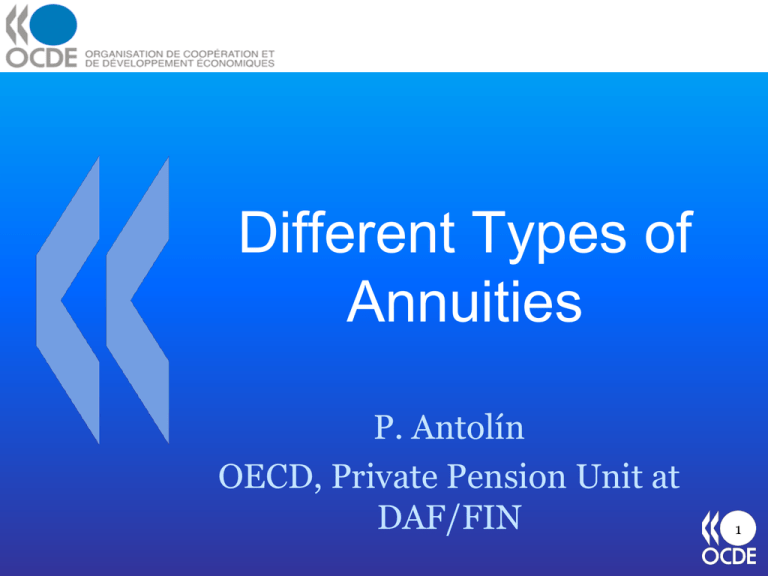Different Types of Annuities
advertisement

Different Types of Annuities P. Antolín OECD, Private Pension Unit at DAF/FIN 1 Structure of the talk • What do we mean by annuities? • Distinguishing between annuity payments and annuity products. • The type of annuity products. • How annuity products can help bridge the transition from accumulation to payout phase. • The risks involved (e.g. longevity risk). 2 What is an annuity? • An annuity is an amount of money paid to someone at some regular interval. • Most people think in terms of annuity products: an agreement or contract for one person or organisation to pay another (the annuitant) a stream or series of payments (annuity payments). 3 Annuity payments and products • A public pension is a stream of income paid at regular intervals. • The pension benefits paid by a definedbenefit pension plan is a stream of income paid at regular intervals. • An annuity product is a contract, different from an annuity payment. 4 Annuitization • Financial economics: people better off if a large share of their retirement income is annuitized (protect against longevity risk) • Until recently people where heavily annuitized through public pensions and DB pension plans. • They both provide a constant stream of income at retirement or annuity payment. 5 Relevance of annuity products • Recent changes in public pensions: lower RR. • Shift from DB to DC funded pension plans • Need to buy annuity products to protect against risks, especially longevity risk (the likelihood of outliving one’s resources). 6 Relevance of annuity products • Some countries in LA and CEE have introduced DC personal plans as main source of retirement income. • At retirement, pension wealth is the form of a lump-sum. Retirement income is not annuitized. • Annuity products could help in bridging the accumulation and the pay-out phase. 7 Type of annuity products • There are several dimensions to classified annuity products. • According to the type of guarantees they provide. 8 According to how they financed • Single premium • Flexible premium (e.g. contributions) – Fixed – Variable 9 According to primary purpose • Immediate pay-out • Deferred (accumulation) 10 According to the underlying investment • According how annuity products create future value • Fixed: guarantee a return and a specific payout at retirement. • Variable: returns and payment depend on how your portfolio performs • Equity-index 11 According to the nature of the payout commitment • The duration of the payout • Life: payout last for the life time of the annuitant • Fixed-tem or certain: e.g. 10 years • Temporary: payout last for the earlier of the two • Guarantee: payout last for the later of the two 12 According to the providers • Qualified annuities: the provider during both the accumulation and the pay-out phases is the same (annuities as vehicles attached to certain retirement plans, 401(k)s, IRAs) • Non-qualified: providers are separate entities 13 According to … • People covered – Single – Joint-survivor • Way annuity is purchased – Individual – Group • Other feature – Enhanced or impaired – Inflation indexed – Tax advantages 14 Several dimensions to classify annuities How they are financed • Single premium • Flexible premium (contributions) • Fixed • Variable Nature of the pay-out commitment • • • • Fixed-term or annuity certain Life annuity Temporary annuity Guarantee annuity Primary purpose • Immediate pay-out • Deferred (accumulation) • Fixed • Variable • Equity-indexed People covered Providers (accumulation or payout phase) • Qualified • Non-qualified Way the annuity is purchased • Individual • Group Underlying investment • Single • Joint-and-survivor Others • Tax advantages • Enhanced vs impaired annuities • Inflation indexed annuities 15 Annuity products and guarantees • What distinguishes the different type of annuity products is the type of guarantees they provide • These guarantees determine the size of the risks involved in annuities: – Longevity risk. – Investment risk. – Interest rate risk. – Inflation risk. 16 Annuity products and risks • Life, deferred and fixed annuity. This is the annuity product that replicates a DB plan 1. Impact of LR on the total amount of annuity payments (liabilities) (LR: uncertainty regarding future mortality and life expectancy outcomes) 2. The interaction btw the risks involved (interest rate and LR): super-additivity. 17 The impact of unexpected gains in LEx • Increase in the NPV of annuity payments to an individual aged 70, 65, 55 and 35 in 2005. • The payment is 10.000€ in 2005. Wages grow at 1.75%, inflation 1.75% and the discount rate is 3.5% • Base case: using current life tables. A fund (membership structure 2.5, 10, • Case 1: using projections of improvements in life expectancy 25 and 62.5%) at birth of only 1.2 years per decade. • Case 2: life expectancy at birth increases a 2.2 years per decade. Impact of longevity improvements and changes in interest rates on annuity payments Percentage change in the net present value of annuity payments, 2005- 2090 Interest rates Improvements in life expectancy 3.5 4.5 5.5 No improvements, latest available mortality table used (2005) individual aged 65 in 2005 118.6 108.6 100.0 individual aged 25 in 2005 254.6 158.9 100.0 Life expectancy improves by 1.2 years per decade individual aged 65 in 2005 122.3 111.6 102.4 individual aged 25 in 2005 312.7 192.6 119.8 Source: OECD Conclusions • Annuity products could help bridge the transition from the accumulation to the payout phase. • Several types of annuity products depending on the type of guarantees provided. • Depending on those guarantees different impact of risks. • LR non-negligible. Super-additivity effect. 21 THANK YOU! pablo.antolin@oecd.org http://www.oecd.org/daf/pensions











